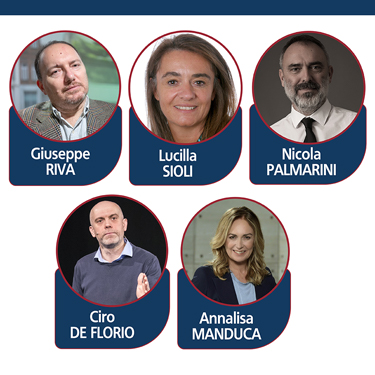
News | research
The multidisciplinary approach against the risks of Artificial Intelligence
The report of the presentation webinar of the new Humane Technology Lab research laboratory
| Katia Biondi
04 giugno 2021
Condividi su:

Will artificial intelligence change the world? Does smart working improve people's quality of life? Does online education allow to improve the teaching experience? «Usually, to deal with these issues are engineers, programmers, AI and robotics experts», said Giuseppe Riva, Director of Humane Technology Lab, the recently founded Laboratory of Università Cattolica del Sacro Cuore that brings together the different skills of the University to offer a multidisciplinary approach to the understanding and the research activities dedicated to the interaction between new technologies and human experience.
According to the Professor of General Psychology, «with Covid, we have witnessed an increasing diffusion of technology: from telepresence to teleworking to the shift to social networks of a whole series of interactions that were previously done primarily face-to-face. This has led to an increase in the debate on what it means to live online». This is a topic in which "the ethical aspect plays a central role" because «what is at stake is not only the maximization of profit but also the dignity of users and respect for their fundamental rights». Therefore «the basic idea of the Lab, which explores the relationship between Artificial Intelligence and daily life from a humanistic perspective, is to offer a point of view that takes into account the human dimension," since "behind the users there are people who can suffer even painful consequences if technology takes control and errs in its decisions».
A first taste of the scientific contribution that the new Humane Technology Lab will give to the cultural reflection on these issues will be offered by the meeting "Is there a digital wisdom?" live streaming Thursday, June 10, at 6 pm, on the social channels of Università Cattolica. Moderated by journalist and Radio Uno Rai presenter Annalisa Manduca, Giuseppe Riva and Ciro De Florio, Professor of Logic and Philosophy of Science at Università Cattolica, will be joined by two of the leading international experts in Artificial Intelligence: Lucilla Sioli and Nicola Palmarini, both alumni of Università Cattolica. Sioli, who holds two doctorates in Economics from the University of Southampton and Università Cattolica, is Director for Artificial Intelligence and Digital Industry at the European Commission and is responsible for coordinating the European strategy for the digitalization of industry and policy development in the field of Artificial Intelligence (AI). Palmarini, who holds a degree in Political Sciences from Università Cattolica, is Director of the UK's National Innovation Centre for Ageing (NICA), a cutting-edge centre created through a collaboration between the UK government and Newcastle University to develop innovative solutions dedicated to the longevity economy. Previously, in the US, he was AI Ethics Lead at the Joint Laboratory on Artificial Intelligence of MIT and IBM and Director of the IBM Human Centric Solution Center, focused on emerging technologies for the elderly.
The main purpose of Humane Technology Lab is, therefore, to promote and enhance multidisciplinary research activities on the relationships between technologies and different dimensions of human experience, both in the academic field and especially in the perspective of cultural dissemination to a wider audience. "Starting from the recognition of human dignity, that is, that every user of technology is a person and as such has its own emotions, its own goals, its own aspirations, the work of the Laboratory will focus on two aspects: on the one hand, the so-called positive technology, to understand what well-being it can produce on the community and society as a whole. On the other hand, knowing that technology can be invasive and have negative impacts, to identify problems and find short-term solutions for preventive purposes."
The Laboratory avails itself of a group of researchers from various faculties of the University – from Psychology to Economics, from Law to Political and Social Sciences, from Education to Agriculture, Food and Environmental Sciences, just to name a few – and is already engaged in various research areas: robotics and the world of work; artificial intelligence and legal issues; machine learning and the transformation of educational models; cyberpsychology; technology and the environment.
As for the first activities of Humane Technology Lab, they include the participation in the first national PhD in Artificial Intelligence (PhD AI); the strengthening of the relationship with the Italian Institute of Technology; the activation of international research collaborations within the Strategic Alliance of Catholic Research Universities (Sacru) and the organization of the world conference on CyberPsychology, scheduled for mid-September.
Un articolo di
